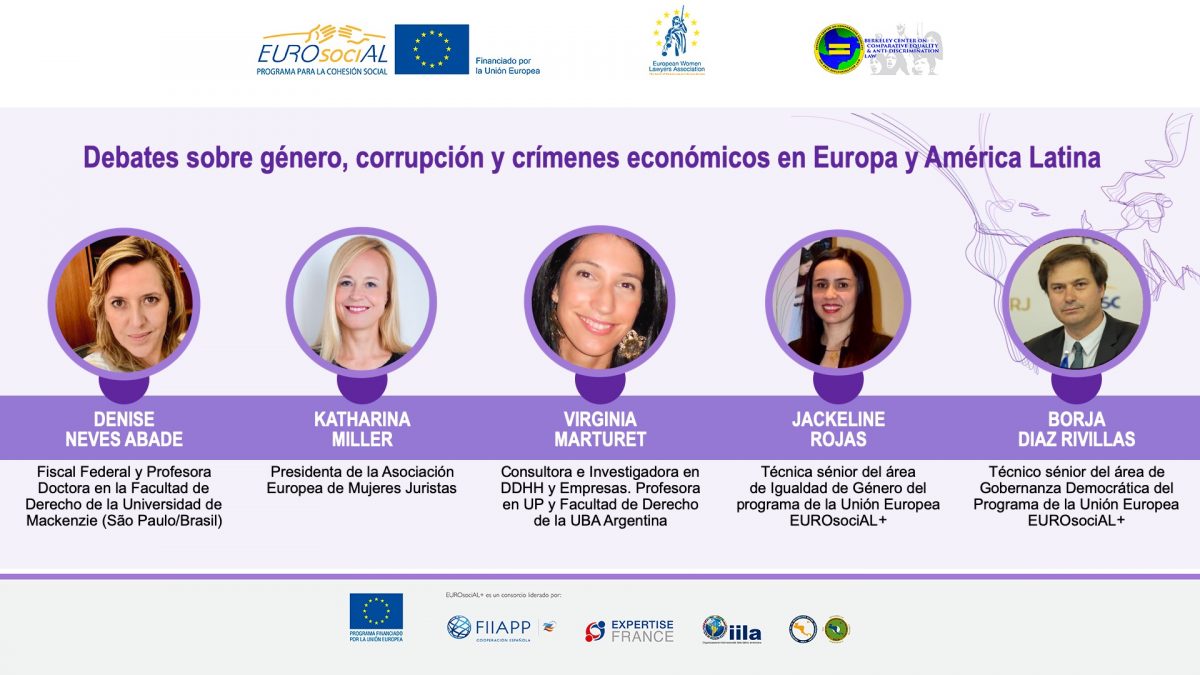The EU EUROsociAL+ Programme promoted a debate on economic crime and corruption from a gender perspective, organised by the Expertise France Gender Equality Policy Area, in coordination with the FIIAPP Democratic Governance Area

Economic crime is usually analysed from a perspective related to financial loss, illegal money flows and efforts to transform illegal earnings into legal money. However, by looking more deeply behind the veil over the scenario that fosters these crimes, the sexual division of tasks appears as the generator matrix for a system that relies, in its formal and informal parts, on gender inequalities to function. While, at first glance, the movement of assets and legal and illegal flows do not seem to be related to gender inequality, they, in fact, find the landscape conducive to exploiting, deepening and propagating it.
In order to discuss this specific issue, which is one of the least understood in terms of gender inequalities, on 4 December an event was held entitled “Debates on Gender, Corruption and Economic Crimes in Europe and Latin America”, which was organised by the European Women Lawyers Association, Berkeley Center on Comparative Equality & Anti-Discrimination Law and the EU EUROsociAL+ programme Gender Equality Policy Area. During the sessions, issues such as gender relations within criminal structures and markets were discussed in order to make visible, question and analyse the way in which they operate around systems of collective interaction, thereby generating new questions and inputs aimed at understanding these economic crimes, which include corruption.
The analysis of the connection between gender and economic crimes, which include corruption, has been the focus of the dialogue in this event, which has sought to make visible the direct and negative impacts of the corruption suffered by girls and women as a vulnerable population and analyse the elements that can strengthen the strategies and tools employed to include the gender perspective in public policies.
Corruption blocks women’s access to politics or acts as a deterrent
Jackeline Rojas, a senior technician in the Gender Equality Area of the European Union EUROsociAL+ Programme, was in charge of opening and contextualising the event, explaining the integration of the gender approach into public policies and the Latin American context. Denise Neves Abade, a federal prosecutor and doctor professor at the Mackenzie University School of Law, was in charge of showing how the gender approach can be incorporated as a tool to prevent corruption and clarify the different approaches to the relationship between corruption and gender. The intervention was based on how corruption affects women differently in that they are more vulnerable and the gender perspective in public policies can help prevent it. “The first studies on these issues claimed that women would be less involved in corruption due to moral or psychological issues or ‘their more caring nature’. The debate on corruption and gender must not resort to these essentialist thoughts and must be carried out in a more critical way,” explained Dr. Abade.
“The real explanation is not that women are less corrupt by nature, but rather that they have fewer opportunities for corruption than men due to structural gender inequality […] Many of these corruption practices take place in economic or political contexts that women have, historically, had less access to […]. In addition, there are studies that indicate that corruption blocks women’s access to politics or acts as a deterrent for women who consider entering,” said Abade.
The pandemic is delaying the advance of political debates on gender issues
To continue the event, Virginia Marturet, a consultant and researcher with Human Rights and Business, addressed the issue of gender and corruption within work environments. Throughout her speech, she spoke about how the context of the pandemic is affecting and delaying political debates on gender issues and how freedoms are being curtailed due to these delays.
For his part, Borja Diaz Rivillas, a senior technician in the EUROsociAL+ Democratic Governance Area, was in charge of continuing with the presentations talking about the differentiated impacts of corruption on women and girls in Latin America, as well as all the actions carried out by EUROsociAL+, such as the formulation of a diagnosis on gender and corruption, a multi-actor dialogue to position the agenda and the design of tools and protocols. In particular, work has been carried out with the Ibero-American Association of Public Ministries (AIAMP), through its Anti-Corruption and Human Trafficking networks, to implement work plans.
The last presentation was given by Katharina Miller, the president of the European Women Lawyers Association, and it dealt with sextortion, a widespread blackmail practice that mostly affects women and adolescent girls and is one more form of gender violence.



